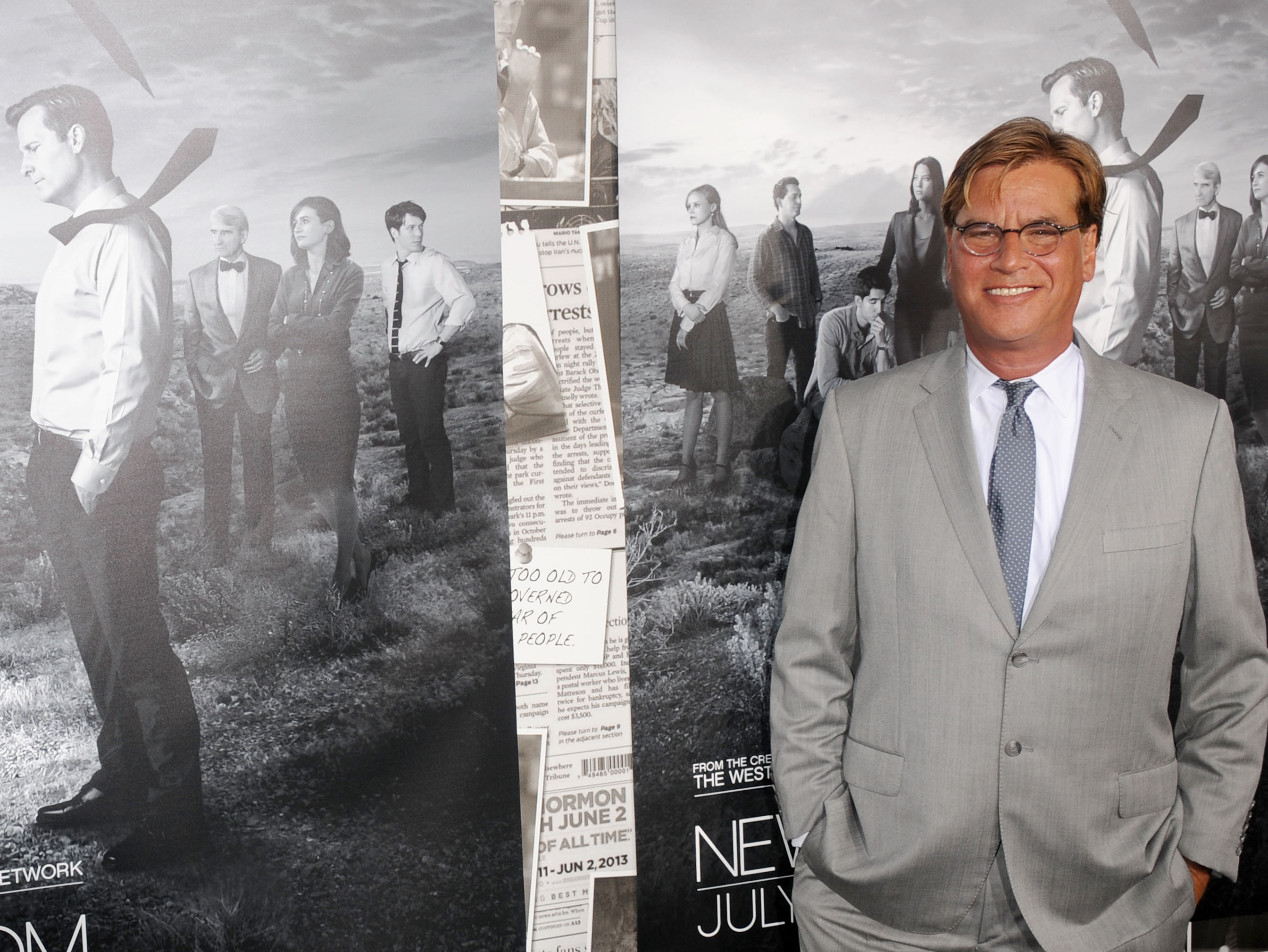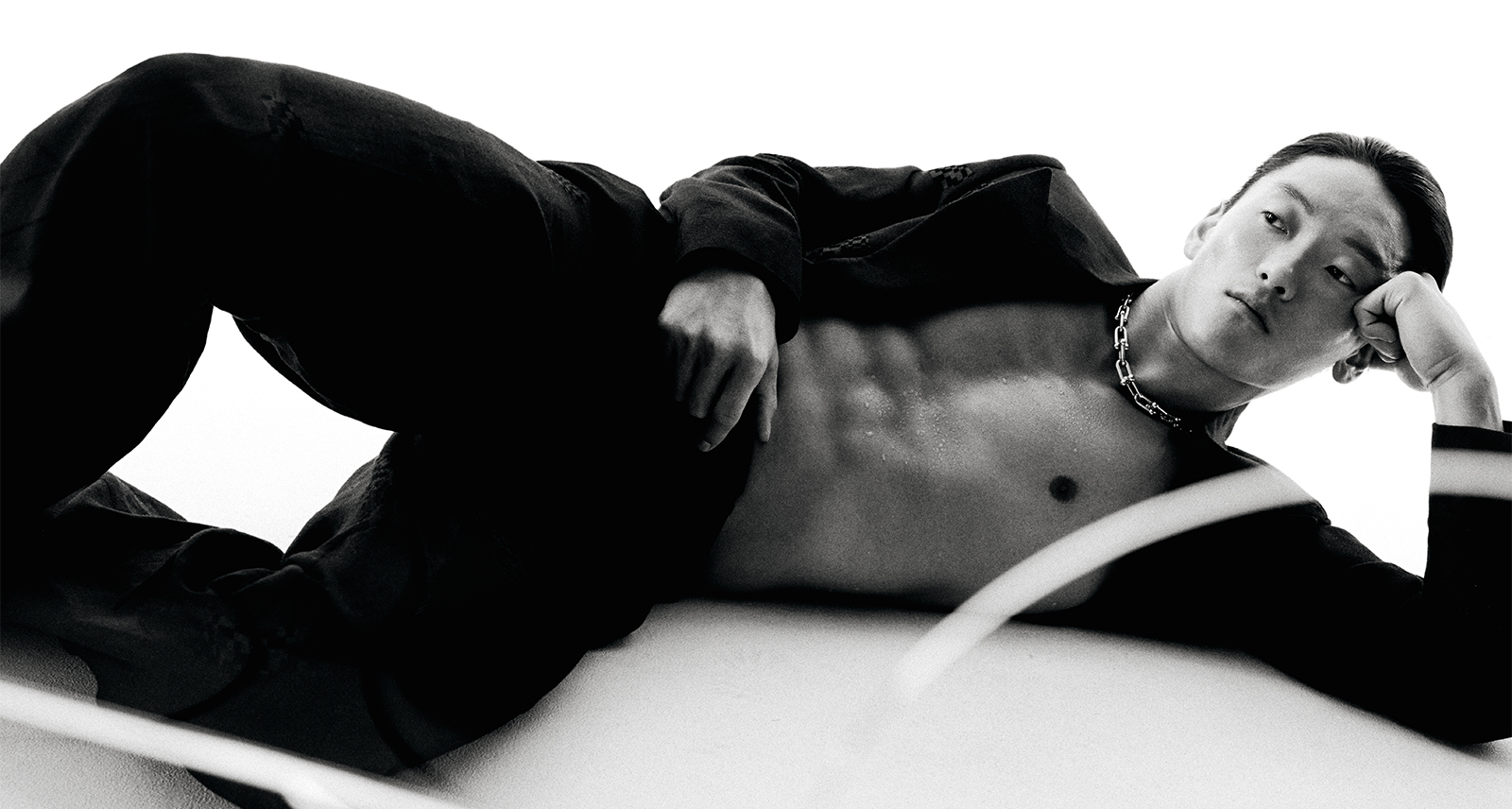A Man Worth Listening To: Aaron Sorkin
You expect Aaron Sorkin to speak in a certain way. His characters, whether President Josiah Bartlet in The West Wing, Mark Zuckerberg in The Social Network, or the hard-charging news team in The Newsroom, are all super-competent and uncannily eloquent. They speak in paragraphs peppered with impossible stats and zinging repartee. And, as a result of all that walking-talking intelligence, they tend not to suffer fools very well. Of course, you’d think, the guy who makes them talk like that would be the same. He is their god, and he created them in his image, is the thinking.
But, no, not really. Turns out, Aaron Sorkin talks more like a writer than a character he has written. He’s measured, thoughtful. It makes sense—before he was one of the few screenwriters who actually draws an audience (seriously, name two other screenwriters, who don’t direct, that get name-checked in trailers)—he was just a playwright. A wunderkind playwright, but still. It’s nice to know the man hasn’t forgotten his roots.
. . . .
The last season of The Newsroom is only six episodes, which makes it more like releasing a movie. Is that more nerve-racking than rolling out a longer season?
Whether I’m doing a movie, whether I’m doing a series, whether I’m doing a series where I make them all and release it or I’m broadcasting them as I go. Whether I’m doing a play, whether that play is in a Broadway theatre, or a 99-seat church basement someplace, I max out on nervousness. There’s no extra nervousness, and there’s no situation where I’m not nervous. It’s the same level of nervousness no matter what.
Has it gotten easier over the years?
No. After everything I write I’m certain I’m not going to be able to write the next thing. Even though, intellectually, you can say, “well, you’ve felt this way a hundred times and somehow it’s worked out,” emotionally, you can’t connect with that logic.
That’s surprising to me. None of your characters seem to have that doubt.
At the beginning of my career there was a great writer who took me under his wing—William Goldman—who is a great novelist, a great screenwriter…
He wrote The Princess Bride.
Both the novel and the movie. He won Oscars for All the President’s Men and Butch Cassidy and the Sundance Kid. And I was amazed that he was insecure. I thought, if Bill Goldman is insecure, what hope is there for the rest of us? And it turns out, I’ve never met a writer, honestly, who feels like, “My golf swing is my golf swing, I can just hit it off the tee.” You always feel like, “Here comes the one where you get found out, where you’re really going to blow it.”
You’ve mentioned that growing up, you never felt like you were the smartest guy in the room. I wondered what your definition of intelligence was that would make you feel like you didn’t have it.
That’s an interesting question. I felt that way with my friends, I felt that way at the dinner table with my family. There was some empirical data: my friends were people who got better grades than I got, and did better on tests, but just listening to them I thought they really had a way with an argument that I admired, and what I fell in love with, frankly, was the sound of it, and the power of it. I wanted to imitate that.
And, in the moment,
you felt like you weren’t there yet?
Yeah, and I still don’t think I’m there. I think what I’m able to do is phonetically re-create these things.
Like, I’m Jewish, but I have no religious training; I never went to Hebrew school. And in seventh grade, every Friday, every Saturday, you start going to your friends’ bar mitzvahs and bat mitzvahs. I thought they were really, really cool. Suddenly, I wanted to have a bar mitzvah, so about six weeks away from my 13th birthday, I opened the local phone book, and cold called a rabbi, and said, “Rabbi, I’m turning 13 in six weeks, I’d like you to teach me the Torah.” And he said, “You know kid, I can’t teach you the Torah in six weeks. It takes years.” And I said, “No no no, I’ve got a really good ear. If you just say it into a tape recorder, I’ll be able to learn it.” He pointed out that that was hardly the reason to be bar mitzvahed. I’ve brought that attitude into my writing, which is creating the sound of somebody who knows their way around a navy court marshal, or how to code Facebook, or run a baseball team, or be the executive producer of a
cable newscast.
You often write about good men becoming great, or striving for that. I wonder if that’s something you think about a lot… Is that why it comes out in your writing? Or is it just because it’s an interesting narrative?
Both, I think. I do think about what’s the right thing to do. Am I doing something because it’s the easy thing to do, am I not being strong here? I do think about those things. But I love talking about those things in storytelling. I don’t know anyone who sees themself as a villain. On those occasions where I’ve written an anti-hero, or an antagonist, I write them as if they are trying to make their case to God why they should be allowed into heaven.
I’ve found, at least for me, the more I have to deal with general humanity, the more annoyed I get. When you need to make something for all audiences, do you respect them more, or do you start respecting them a little less?
There are a couple of things I want to address in there. First, I have enormous respect for the audience. I appreciate that they came to check out whatever it is I did. And my only goal is to make sure they didn’t waste their time. But, while I would love for everybody to like what I wrote, I know it’s not going to happen. And it’s definitely not what I’m trying to do. Trying to figure out what everybody likes and giving it to them is a bad recipe for good storytelling. All I can do is try to write what I like, what I think my friends would like, what I think my father would like, and then keep my fingers crossed that enough people will like it that I can earn a living.
Speaking of finding a balance, you’ve responded to critics of The Newsroom by reinforcing that you’re more interested in storytelling than in activism. You’ve said you can’t teach anyone anything, or change anyone’s mind, but I feel like that’s the purpose of art, isn’t it?
It’s always great when it can. My first call is always, again, captivating you for however long I’ve asked for your attention. It’s not to convince you of anything, or bring you over to my side, but if it changes a mind, if it inspires somebody, that’s fantastic. It can do that. But, if you sit down with the goal of being an activist, you might succeed at being an activist, but you’re going to have less of a chance of making a good piece of art.
You seem nostalgic. I come from a generation that seems to run on immediate nostalgia. We compile Buzzfeed lists of things that happened 10 years ago. There’s danger in that. How do you make a balance between looking back and getting trapped in looking back?
That’s a good question. When I look back, I look back further than 10 years. Ten years doesn’t seem like a very long time. I try to look at what was good about the past, that we might have lost touch with a little bit. I try to find a way to remind us of what was good. Whether it’s exploration, going to the moon; whether it’s civility, that kind of thing. A smaller mind will say that, but you’re also talking about a time when there was Jim Crow, and gay people were in the closet, and that kind of thing. I get it. The present and hopefully the future are, in many important ways, much better than the past. But there are things about the past that were good.










